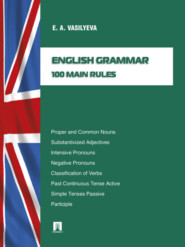скачать книгу бесплатно
All the milk wasfresh.
All the book wastorn out.
Note
You may use the whole + noun instead of all the + noun
when it goes with a singular countable noun.
The wholebook was torn out.
– If all precedes other noun modifiers (the, this, my, etc), then it can be used either as all + noun, or all of + noun.
Andrew invitedall his (all of his)friends.
It's important to answerall the (all of the)questions.
Note
Use all of before object pronouns, but just all after them.
Andrew invitedall of them (them all).
All of you (You all)have various questions.
– As the subject it agrees with either singular or plural verb, that depends on the context.
Allis well that ends well.
Allhave gone.
– If the subject is a personal pronoun, then all is put between and the verb.
Wealldecided to dinner out the next day.
Theyallskate in winter.
– If there is a linking verb, an auxiliary or modal one, then all goes after the first verb.
We areallhere.
They haveallseen the movie.
You shouldalltake part in this conference.
Note
All is quite often substituted by comounds everybody, everyone, everything.
Allare happy. => Everyone is happy.
Allis ready. => Everything is ready.
both
– with plural countables
– refers to two persons or things
I likeboth(ties).
Both(applicants) are equally experienced.
– agrees with a plural verb
Which project is better?Bothare good.
– Use of between both and another determiner.
Both of theserestaurants are expensive.
Olivia knowsboth of hisbrothers.
– Use both of with a personal object pronoun (him, her, them, etc); use both after a personal subject pronoun (he, she, they).
Both ofthem (They both) are suitable.
It's a game thatboth ofus (we both) can play.
RULE 26. Many/Much, Few/Little, Enough
many/much
– many with countable nouns; much with uncountable nouns
– refer to indefinitely large number of things or persons
Are theremanybooks on the desk?
Will it takemuchtime to get to the centre?
– mostly used in negative sentences and questions
Howmanyfriends have you got?
There isn'tmuchsense in it.
– If many/much are determined by as, so, too, very, use them in affirmative sentences as well.
There weretoomany variants to choose.
They have changed somuchthis year.
– If many/much are the subject or the subject attribute, then they can be used in affirmative sentences too.
Muchof the work has already been completed.
Manystudents attend extra classes.
Note
Words a lot (of), lots (of), a plenty (of) are commonly used in affirmative sentences.
We havea lotto discuss.
There arelots ofeasy ways to follow.
They still haveplenty ofsnow.
few, little
– few with countables; little with uncountables
– refer to indefinitely small number off things or persons; the implied meaning is "not enough"
Nick is sad because he hasfewfriends here.
There waslittleflour, so I couldn't bake a cake.
– The indefinite article a/an with the pronouns few/little changes the implied meaning for positive "enough".
John hasa fewfriends there.
There wasa littleflour, so I could bake a cake.
– It is preferable to use any in negative sentences and questions.
Does John haveanyfriends there?
Andy doesn't haveanyfriends there.
Is thereanyflour at home?
There isnoflour at all.
enough
– with both countable and uncountable nouns
– refers to indefinite but sufficient number of something
You haveenoughtime to write an article.
Andrew told themenough.
RULE 27. One/Ones
one
– refers to an undetermined person in general
Onecannot learn a language in three months.
Oneshould pay taxes.
Note
In the informal language undetermined persons can be as well expressed by the pronouns you or they.
Youmust always try to do your best.
Theysay the weather is changing.
Note
The pronoun one can be used in the possessive form (one's) or in its reflexive form (oneself).
One must learn fromone'smistakes.
One should be careful not to hurtoneself.
– agrees with a singular verb
Oneneverknowswhat may happen.
More thanonevariantisappropriate.
– substitutes the noun to avoid repetition; often used in Which-questions
See those two handsome men? Andrew is the tallerone.
Which dress has Olivia chosen? The redone.
Note
the plural form of the pronoun is also possible.
Andrew bought three apples: a redoneand two yellowones.
